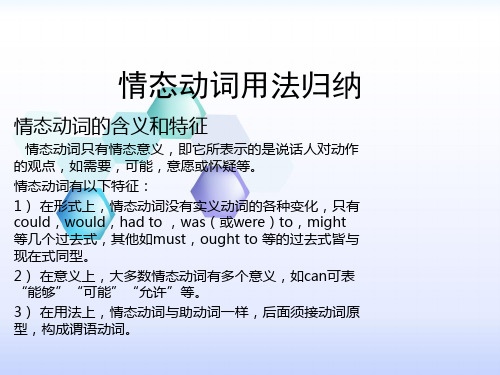高中英语情态动词详解2017
- 格式:ppt
- 大小:2.60 MB
- 文档页数:65

一、情态动词用法1.情态动词的具体用法A.能干can/could do; (经过努力)能干be able to (have the ability to do, be capable of doing)B.必须干/不得不干must / have to do; 不许干:mustn’t doC.(经允许)可以干may/ might do; 不可以干:may not doD.应该干should /ought to/ be to/ be supposed to doE.将要干will/would/shall do; (按法律,许诺,命令,威胁,第二三人称中) 将干shall doF.(某段具体时间)常干would do; (现在不做,过去常做) used to doG.宁愿做would rather do; 最好做had better do; 不妨做might as well doH.需要做need do ; 敢做dare do2.情态动词表猜测A.一定是must be ;一定已经干了某事must have done sth.; 一定不是can’t/couldn’t be ; 一定没干过某事can’t/couldn’t have done sth.B.可能(不)是may/might (not ) be; 可能已经(没)干某事may/might (not) have done sth.3.情态动词与虚拟语气A.本应该干某事(带有批评责备之意)should/ ought to have done sth.;本不该做了某事而做了shouldn’t /oughtn’t to h ave done sthB.本不必干某事needn’t have done sth.C.本可以干某事can/could have done sth.D.本(不会)干某事would (not) have done sth.E.真希望做过某事would like to have done sth.F.Should 在表建议的从句中:(a)It’s high time that sb. should do/did sth(b)It’s important sb. (should) do sth.(c)I suggest sb. (should ) do sth.二、理解情态动词Lucy is an outgoing lady. She can play many kinds of musical instruments. Actually, she could play the piano when she was 8 years old. Lucy also keeps taking exercise every day. She says that she has to do some sports because she must keep slim. “You shall get fat soon if you don’t take exercise every day.” She usually says to her friends.As for her, an elegant lady should try to keep fit. However, last week, she found that she might put on weight and she worried and decided to lose her weight. And these days she is always thinking that she may succeed soon if she tries all her best. However, she is always lack of time because she ought to take care of her children.One night after supper, she walked quickly in order to go dancing at the Tomorrow Park and she was late. On her way, she thought that the dancing must havebegun, and the coach could have taught or shown many new moves. She was afraid that her friends might have left before she got there. She was regretful then. She should have had supper earlier, or she could have taken a taxi, and indeed she needn’t have taken a bath in advance. When she reached the park finally, she found nobody was there. She remembered suddenly that it had been reported on the radio that there would be a heavy rain that night.思考每个加黑的情态动词的含义;什么时候用情态动词的完成式,分别表达什么意思。



情态动词知识点总结高中情态动词是英语中一个重要的语法现象,它们能够表达说话者的情感、态度、意愿等,以及表达说话者对事件的推测、猜测、可能性等。
了解情态动词的用法,能够帮助我们更准确地表达自己的意思,也有助于我们理解他人的意图。
本文将对情态动词的概念、用法、以及常见的情态动词进行总结和归纳,以便于读者更深入地理解情态动词的使用。
一、情态动词的概念情态动词(Modal Verb)是一类特殊的助动词,用来表示说话者的情感、态度、意愿等,以及表达说话者对事件的推测、猜测、可能性等。
情态动词通常用于句子的前面,后面跟动词原形,用来构成不同的语法结构和表达不同的含义。
英语中常见的情态动词有can、could、may、might、must、shall、should、will、would、ought to等。
这些情态动词具有一些共同的特点,比如不能独立完成谓语,后面必须跟动词原形;在疑问句和否定句中,情态动词的位置要发生变化等。
二、情态动词的用法1. 表示能力和可能性can与could表示说话者的能力或者对某种事情的可能性,其中can用于现在时,could用于过去时。
比如:I can speak Spanish.(我会说西班牙语。
)She could swim when she was five.(她五岁的时候就会游泳。
)may与might也表示可能性,may 用于现在时,might 用于过去时。
比如:It may rain tomorrow.(明天可能会下雨。
)I thought she might come.(我以为她可能会来。
)2. 表示请求和建议will与would可以表示请求,will用于肯定句,would用于否定句和疑问句。
比如:Will you please help me?(你能帮帮我吗?)I would like to go with you.(我想和你一起去。
)shall与should也可以表示请求或者建议,should更多地表示建议。


高中英语语法讲解情态动词概述1. 共有10个情态动词:can/could, may/might, will/would, shall, should, ought to, must;2个半情态动词need,dare2. 特点:(1)情态动词后加动词原形(即不带to的不定式)一起构成谓语;(2)没有人称和数的变化;(3)多数情态动词有过去式,但其过去式有时并不表示时态,而只起“委婉或不确定语气”的作用。
Would you do me a favour?She may/might be watering the flowers now.3. 情态动词在句子中可发挥不同作用,如表能力,表责任与义务,表推测,表征求允许,表请求,表建议,表语气态度等等● He can/could run 100 meters in 11 seconds.● You should/ought to/must work hard to win a gold medal.● Can/Could/May/Might I watch the Olympics tonight?● Will/Can/Could/Would you help me with my training?● He might/may/could/should/ought to/will/must watch the football match tonight.● I suggest that you should watch the opening ceremony.● Can this be true?4. (1)情态动词+do 表对一般现在或将来情况的推测(2)情态动词+ be doing 表对正在发生的事情的推测(3)情态动词+have done 表对过去已经发生的事情的推测● 常见“情态动词+have done”归纳1. could have done 过去本有能力做某事但没做(虚拟)2. may/might have done ①过去可能已经做了某事(推测)②过去本可能做某事但没做(虚拟)(责备)3. must have done过去一定已经做了某事(推测)4. can't/couldn't have done过去不可能已经做了某事(推测)5. should/ ought to have done ①过去应该已经做了某事(推测)②过去本应该做某事但没做(虚拟)(责备)6. shouldn't/ oughtn't to have done 过去本不应该做某事但做了(虚拟)(责备)7. needn't have done 过去本不必做某事但做了(虚拟)例句1) You could have got a full mark, but you were to careless.2) She may have missed the first train in the morning.3) You may have hurt yourself when climbing the tree.4) You must have stayed up late last night.5) It can't/couldn't have rained last night, for the streets are dry.6) They should have arrived in Beijing by this time.7) You should have e to the meeting earlier.8) You shouldn't have told Mary the sad truth.9) You needn't have taken a taxi here, for it was near my house.一、can/could 的用法3. 固定用法:(1) can not/never…too/enough “再怎么…也不过分,越…越好”● I can never thank you enough.● You can't be too careful.● You can never remember too many words.(2) can't + 比较级“不能更...,非常...”● I can't agree more.● The film couldn't be more boring(3) cannot but do sth. 不得不,只好● I cannot but admire your bravery.(4) can't help doing sth 情不自禁做; can't help (to) do sth 不能帮忙做二、may/might的用法3.may表示祝愿或希望。
情态动词和虚拟语气第一部分、情态动词一、can/could与be able to1.can/could用来表示“一般能力”;be able to有多种时态,且用来表示在特定条件下的“具体能力”.如:My grandma is over seventy,but she can still read without glasses.They will be able to tell you the news soon.He was able to flee Europe before the war broke out.2.表示允许可用can或could,与may/might意义接近.could可用于现在时,只是语气更加委婉、客气,回答时则一般要用can而不用could.—Could I have the television on?—Yes,you can./No,you can't.二、may与might1.表示允许,意为“可以,许可”,用法基本上同can与could.如:May I use your bicycle?2.表示可能性,意为“也许,可能”.如:According to the weather forecast, it may rain tomorrow.3.may可以放在句首,表示祝愿.如:May good luck be yours!三、must与have to1.must用来表示说话人的主观看法;have to表示客观的需要,强调外界压力,不得已而为之.如:He said that they must work hard.他说他们必须努力工作.(主观上要做这件事)My brother was ill, so I had to call the doctor in the middle of the night.我弟弟生病了,我只得半夜里把医生请来.(客观上需要做这件事)2.表示“不必”,须用don't have to或needn't.must的否定式表示“禁止,绝对不可”.如:You don't have to tell him about it.你不必告诉他那件事.You mustn't tell him about it.你绝不能告诉他那件事.—Must we do it now?我们必须现在做吗?—No, you needn't.不,你们不必.四、shall1.用于第一、第三人称的疑问句中,用来征求对方的意见或请求指示.如:What shall he do next?他下一步干什么呢?2.用于第二、第三人称的陈述句中,表示说话人的意愿,有“命令、警告、允诺、威胁、强制”等意思.如:He shall stay in bed.他必须躺在床上.You shall have it back next week.下周一定还你.He says he won't go, but I say he shall.他说他不去,但我说他必须去.五、will与would1.will用于各种人称,表示“意志、意愿”或“决心”等.如:If you will keep your watch half an hour slow, it is hardly surprising that you are late for your appointments.如果你想要让你的表慢半个小时,你约会时迟到就不足为怪了.2.will表示习惯性的动作,有“总是,惯于”的含义.如:An Englishman will usually show you the way in the street.英国人通常是会在街上给你指路的.3.would可表示过去反复发生的动作.如:On Sundays he would get up early and go fishing.星期天他总是早起去钓鱼.六、should与ought to1.should表示“建议”或“劝告”,有“应该”之意.如:You should learn from each other.2.ought to表示根据某种义务或必要“应当”做某事.如:Everyone ought to obey the traffic regulations.3.should和ought to也可用来表示推测,意为“想必会……”.如:—When can I come for the photos? I need them tomorrow afternoon.—They should be ready by 1200.七、情态动词表示推测1.can用于肯定句中表示客观的可能性,意为“有时会”;用于疑问句中可以表示推测,意为“可能”,有时表示一种惊讶的语气;用于否定句中也可以表示推测,can't意为“不可能”,语气很强烈.It is usually warm in my hometown in March, but it can be rather cold sometimes.我的家乡在三月份通常很暖和,但有时候也会相当冷.Mr. Bush is on time for everything. How can it be that he was late for the meeting?布什先生做什么事情都很准时,他怎么可能开会迟到呢?—Let's visit Tom together, Stephen.—There's no need to do so. He can't be at home, because I saw him board the flight to Beijing this morning.——Stephen,咱们一起拜访汤姆吧.——没必要这样做.他一定不在家,因为今天早晨我看见他登上了飞往北京的航班.2.may/might用于肯定句中可以用来表示不十分肯定的推测,意为“有可能”;用于否定句中也可以表示推测,may not意为“可能不”,表示一种不太确定的语气.The traffic is heavy these days. I might arrive a bit late, so could you save me a place?这些天交通很繁忙,我可能会来晚一点,请你帮我保留个位置好吗?3.must表示推测时只能用于肯定句中,意为“一定,必定”,表示十分肯定的语气(在疑问句中或否定句中要用can/could).—It's the office! So you must know eating is not allowed here.—Oh, sorry.——这是办公室!所以你一定知道这里不许吃东西.——噢,对不起.4.should用来表示推测时意为“应该”,即含有“按道理来说应当如此”的意思.There shouldn't be any difficulty about passing the road test since you have practiced a lotin the driving school.因为你在驾校训练了这么多,通过路考应该没什么困难.八、“情态动词+have done”结构1.should/ought to+have done,表示“过去本应该做而(实际)没有做的事情”,含有责备或遗憾的语气,意为“本应该……”.其否定形式为“should not/ought not to have+done”,表示某种行为本不该发生但实际上发生了.I shouldn't have watched that movie—it'll give me horrible dreams.我本不应该看那部电影——它会令我做噩梦.You ought to have come to the party yesterday, but why didn't you come?昨天你本来应该参加聚会的,可是你为什么不来?2.must+have done,用于肯定句,表示“过去一定做过某事”,表示一种很有把握的推测.注意,对过去发生的情况的否定推测常用“can't/couldn't+have done”表示.—Ye Shiwen won two gold medals in London Olympic Games.—She must have gone through tough training.——叶诗文在伦敦奥运会获得了两枚金牌.——她肯定受到严格的训练.—Do you know where David is? I couldn't find him anywhere.—Well. He can't have gone far—his coat's still here.——你知道大卫在哪里吗?我到处找不到他.——大卫的上衣还在这里,因此他肯定没走远.3.needn't+have done,表示“过去没有必要做某事,但实际上做了某事”.Mark needn't have hurried. After driving at top speed, he arrived half an hour early.马克本没必要那么匆忙.他以最快速度开车,结果早到了半个小时.4.may/might+have done,表示对过去情况的一种不太有把握的可能性的推测,表示“可能已做了某事……”,否定句表示“可能还没有……”.Sorry, I'm late. I might have turned off the alarm clock and gone back to sleep again.对不起,我迟到了.我可能把闹钟关掉后又睡着了.5.could+have done表示“过去本来可以做某事,但实际上没有做”;can/could+have done表示“过去可能做了某件事”.I could have saved the poor rabbit, but I didn't have the right drugs with me at that moment.我本来可以拯救那只可怜的兔子的,可是我当时没有合适的药品.第二部分、虚拟语气一、虚拟语气在虚拟条件句中的用法1.在具体运用中,条件从句中有时可省略if而采用倒装结构.如:Had it not been for your help, we wouldn't have achieved so much.2.介词without/but for、连词but、副词otherwise常用来表示某种假设条件.如:I wouldn't have made such rapid progress without your help.3.有时候从句动作和主句动作发生的时间不一致,这时谓语动词的形式要根据各自的时间来调整.如:If the weather had been more favourable, the crops would be growing still better.二、“should+动词原形”表示的虚拟语气这一类型常见词有“一坚持(insist)、二命令(order, command)、三建议(advise, suggest, propose)、四要求(request, require, demand, desire)”.以上词及其派生名词所接的名词性从句都使用“(should +)动词原形”的虚拟语气.①Jane's pale face suggested that she was ill, and her mother suggested that she(should) havea medical examination.简苍白的脸色表明她病了,她母亲建议她去检查身体.②She insisted that the man had stolen her car and that he(should) be sent to prison.她坚持说那个男人偷了她的车,并坚决要求他坐牢.三、特殊句式中的虚拟语气If only/It's (high) time (that)...wish/would rather/as if等固定句式要求用相应的虚拟语气表达形式.①I wish I could fly.真希望我能飞.②I would rather you came tomorrow.我宁愿你明天来.③If only I had taken your advice!要是听从了你的建议该多好啊!高频考点一、考查情态动词例1.(2018·北京卷)In today’s information age, the loss of data _________ cause serious problems for a company.A. needB. shouldC. canD. must【答案】C【解析】考查情态动词.句意:在今天的信息时代,数据的丢失有时会对一个公司造成严重的问题.数据丢失造成严重问题是客观上会发生的情况,即“客观可能性”,故该空应用情态动词can.C选项正确.其余情态动词均没有该用法.need需要;should应该,竟然;must必须,肯定.【变式探究】—Can’t you stay a little longer?—It’s getting late. I reall y _____go now, My daughter is home alone.A .mayB .canC . mustD .dare【答案】C【解析】句意:——你不能再多待会儿吗?——很晚了,我必须得走了.我女儿一个人在家.A. may可能,可以,也许;B. can能,会;C. must必须,必然要,必定会;D. dare敢,胆敢.结合句意,故选C.【变式探究】________ I have a word with you? It won’t take long.A. CanB. MustC. ShallD. Should【答案】A【解析】本题考察的是情态动词基本意义辨析.Can能够,可能;must必须,一定;非得;shall将要;should应该;句意:我可以和你谈谈吗?不会花很多时间的.根据句意可知本题使用can I…?表示询问对方是否允许.如:Can I use your dictionary?我可以使用你的字典吗?故A正确.高频考点二、考查情态动词的用法例2. (2018·天津卷) I can't find my purse. I___________ it in the supermarket yesterday, but I'm not sure.A. should leaveB. must have leftC. might leaveD. could have left【答案】D【解析】考查情态动词表推测.句意:我不能找到我的钱包了,昨天我有可能把它落到超市了,但我不确定.根据句中时间状语yesterday可知,是对过去事情的推测,故用情态动词+ have done,再根据后句but I’m not sure.可知,此推测为不能肯定的推测,故用情态动词could,表示“可能”.故选D.【变式探究】(2017•天津)My room is a mess, but I __________clean it before I go out tonight.I can do it in the morning.A. daren’tB. shouldn’tC. needn’tD. mustn’t【答案】C【解析】句意:我的房间很乱,但是在今晚我出去之前不需要打扫,我可以明天早晨再打扫.A.不敢;B.不应该;C不需要;D.不许.根据句意,故选C.【变式探究】Why didn't you tell me about your trouble last week?If you ________(tell)me,I could have helped.【答案】had told【解析】句意:上个星期你为什么不告诉我你的麻烦事?如果你告诉我了,我就能帮你.根据句意和相关信息判断,条件句表示与过去事实相反的假设,此时从句用过去完成时,主句谓语用“情态动词+have done”形式.【变式探究】I ______ have worried before I came to the new school, for my classmates here are very friendly to me.A. mightn’tB. mustn’tC. needn’tD. couldn’t【答案】C【解析】句意:我来新学校之前本没有必要担心,因为在这里我的同学对我非常友好.needn’t have done本没有必要做某事,表示实际上已经做了某事.根据句意可知选C.高频考点三、考查虚拟语气例3.(2019·天津卷)The workers were not better organized, otherwise they ________ the task in half the time.A.accomplished B.had accomplishedC.would accomplish D.would have accomplished【答案】D【解析】考查虚拟语气.句意:工人们没有被组织好,否则的话他们会用那一半的时间完成任务的.此处otherwise表达了一种含蓄虚拟;otherwise前的内容所述的是过去的事实,相当于if引导的条件状语从句“If the workers had been better organized”,因此后半部分应用“主语+would have done sth.”的结构.故选D.【举一反三】【2018·江苏】It’s strange that he _______have taken the books without the owner’s permission.A. wouldB. shouldC. couldD. might【答案】B【解析】考查虚拟语气.句意:真奇怪,他竟然没有主人的允许就拿走了这些书.在句型”It is important/necessary/strange/impossible/natural that...”中,其中由that引导的主语从句通常用“should+动词原形”这样的虚拟语气,其中的should可以省略.故选B.【变式探究】(2017·北京)If the new safety system _______ to use, the accident would never have happened.A. had been putB. were putC. should be putD. would be put【答案】A【解析】句意:如果这个新的安全系统被投入使用过的话,这个事故就不会发生了.根据主句确定是对过去情况的虚拟,所以从句谓语用had done形式,此外根据句意可知是被动,用被动语态,故A项是正确的.【变式探究】________(have)the governments and scientists not worked together,AIDSrelated deaths would not have fallen since their highest in 2005.【答案】Had【解析】句意:如果政府和科学家不共同努力,与艾滋病相关的死亡就不会从2005年的最高点下降.这是一个省略了从属连词if的虚拟语气句,使用了倒装句式.根据主句的would not have fallen可知,这里是表示过去的虚拟语气,所以用had.【变式探究】Without his wartime experiences, Hemingway____ his famous novel A Farewell to Arms.A.didn’t writeB. hadn’t writtenC. wouldn’t w riteD. wouldn’t have written【答案】D【解析】句意:没有他战时的经验,海明威就不可能写出著名的小说永别了武器.根据without his wartime experience没有战时的经历,可知表示对于过去的否定猜测,故主句用would have done,因此选D 项.1.(2019·天津卷)The workers were not better organized, otherwise they ________ the task in half the time.A.accomplished B.had accomplishedC.would accomplish D.would have accomplished【答案】D【解析】考查虚拟语气.句意:工人们没有被组织好,否则的话他们会用那一半的时间完成任务的.此处otherwise表达了一种含蓄虚拟;otherwise前的内容所述的是过去的事实,相当于if引导的条件状语从句“If the workers had been better organized”,因此后半部分应用“主语+would have done sth.”的结构.故选D.2.(2019·江苏卷)What a pity! You missed the sightseeing, or we ________ a good time together.A.had B.will haveC.would have had D.had had【答案】C【解析】考查虚拟语气.句意:多么遗憾!你错过了这次游览.否则,我们就可以一起度过一段愉快的时光.根据关键词or可知,这里表示与过去的事实相反,谓语动词应用would/could/should/might+have done.1.【2018·江苏】 There is a good social life in the village, and I wish I _______ a second chance to become more involved.A. hadB. will haveC. would have hadD. have had【答案】A【解析】考查虚拟语气.句意:在这个村里有很好的社交生活,并且我希望我再有机会去更多的参与.本题考查wish引导的宾语从句,表示与现在事实相反的愿望,所以从句用一般过去时.故选A.2.【2018·江苏】It’s strange that he _______have taken the books without the owner’s permission.A. wouldB. shouldC. couldD. might【答案】B【解析】考查虚拟语气.句意:真奇怪,他竟然没有主人的允许就拿走了这些书.在句型”It isimport ant/necessary/strange/impossible/natural that...”中,其中由that引导的主语从句通常用“should+动词原形”这样的虚拟语气,其中的should可以省略.故选B.3.(2018·天津卷) I can't find my purse. I___________ it in the supermarket yesterday, but I'm not sure.A. should leaveB. must have leftC. might leaveD. could have left【答案】D【解析】考查情态动词表推测.句意:我不能找到我的钱包了,昨天我有可能把它落到超市了,但我不确定.根据句中时间状语yesterday可知,是对过去事情的推测,故用情态动词+ have done,再根据后句but I’m not sure.可知,此推测为不能肯定的推测,故用情态动词could,表示“可能”.故选D.4.(2018·北京卷)In today’s information age, the loss of data _________ cause serious problems for a company.A. needB. shouldC. canD. must【答案】C【解析】考查情态动词.句意:在今天的信息时代,数据的丢失有时会对一个公司造成严重的问题.数据丢失造成严重问题是客观上会发生的情况,即“客观可能性”,故该空应用情态动词can.C选项正确.其余情态动词均没有该用法.need需要;should应该,竟然;must必须,肯定.5.(2018·北京卷)They might have found a better hotel if they _________ a few more kilometers.A. droveB. would driveC. were to driveD. had driven【答案】D【解析】考查虚拟语气.句意:如果他们多开几公里的话,他们也许会找到一个更好的旅馆.由“they might have found a better hotel”可知,该句是表示对过去的虚拟.if ____ a few more kilometers是条件句部分,表示对过去的虚拟,条件句部分要用过去完成时态,故D选项正确.1.(2017·北京)Samuel, the tallest boy in our class, ______ easily reach the books on the top shelf.A. mustB. shouldC. canD. need【答案】C【解析】A. must 必须 B. should 应该 C. can 能 D. need 需要.句意:Samuel,我班最高的男生,能很轻松地够着书架顶上的书,此处需要一个表示能力的词,故用can,答案为C.2.(2017•天津)My room is a mess, but I __________clean it before I go out tonight. I can do it in the morning.A. daren’tB. shouldn’tC. needn’tD. mustn’t【答案】C【解析】句意:我的房间很乱,但是在今晚我出去之前不需要打扫,我可以明天早晨再打扫.A.不敢;B.不应该;C不需要;D.不许.根据句意,故选C.3.(2017•江苏) _______ not for the support of the teachers, the student could not overcome her difficulty.A. It wereB. Were itC. It wasD. Was it【答案】B【解析】考查虚拟语气和倒装.虚拟语气中,be动词统一用were;虚拟语气的省略形式主要是把if省略,同时把were/should/had提前,即Were /Should/ Had I...,故选B.句意:要不是老师们的支持,该生是无法克服她自己的困难的.4.(2017·江苏卷) ____________ not for the support of the teachers, the student could not overcome her difficulty.A. It wereB. Were itC. It wasD. Was it【答案】B【解析】考查虚拟语气的省略.虚拟语气中,be动词统一用were;虚拟语气的省略形式主要是把if省略,同时把were/should/had提前,即Were /Should/ Had I...,故选B.5.(2017•江苏) _______ not for the support of the teachers, the student could not overcomeher difficulty.A. It wereB. Were itC. It wasD. Was it【答案】B【解析】考查虚拟语气和倒装.虚拟语气中,be动词统一用were;虚拟语气的省略形式主要是把if省略,同时把were/should/had提前,即Were /Should/ Had I...,故选B.句意:要不是老师们的支持,该生是无法克服她自己的困难的.6.(2017·北京)If the new safety system _______ to use, the accident would never have happened.A. had been putB. were putC. should be putD. would be put【答案】A【解析】句意:如果这个新的安全系统被投入使用过的话,这个事故就不会发生了.根据主句确定是对过去情况的虚拟,所以从句谓语用had done形式,此外根据句意可知是被动,用被动语态,故A项是正确的.1.(2016·浙江,15)________(have)the governments and scientists not worked together,AIDSrelated deaths would not have fallen since their highest in 2005.【答案】Had【解析】句意:如果政府和科学家不共同努力,与艾滋病相关的死亡就不会从2005年的最高点下降.这是一个省略了从属连词if的虚拟语气句,使用了倒装句式.根据主句的would not have fallen可知,这里是表示过去的虚拟语气,所以用had.2.(2016·浙江,17)George can't ________(go)too far.His coffee is still warm.【答案】have gone【解析】句意:乔治不可能走得太远了.他的咖啡仍然是温的.can't have done是对过去的否定推测.3.(2016·北京,34)Why didn't you tell me about your trouble last week?If you ________(tell)me,I could have helped.【答案】had told【解析】句意:上个星期你为什么不告诉我你的麻烦事?如果你告诉我了,我就能帮你.根据句意和相关信息判断,条件句表示与过去事实相反的假设,此时从句用过去完成时,主句谓语用“情态动词+have done”形式.。
高一常见知识点梳理情态动词与情态副词情态动词是英语中一类特殊的动词,用来表示说话人对动作或状态的态度、意愿、推测、能力等。
情态副词则是用来修饰情态动词的副词。
在高一的英语学习中,情态动词与情态副词是非常重要的知识点。
本文将对高一常见的情态动词与情态副词进行梳理和解析。
一、常见的情态动词1. can(能够)can用来表示能力、许可或可能性。
例如:- She can speak English fluently.(她能够流利地说英语。
)- Can I borrow your pen?(我可以借用你的钢笔吗?)- It can't be true!(这不可能是真的!)2. could(可以)could表示过去的能力、允许或可能性,也可以用来表示委婉语气。
例如:- When I was younger, I could run very fast.(当我年轻的时候,我跑得很快。
)- Could I use your computer for a moment?(我可以用你的电脑一下吗?)- Could you please pass me the salt?(你能请递给我盐吗?)3. may(可能)may表示可能性、允许或请求的委婉语气。
例如:- It may rain tomorrow, so take your umbrella with you.(明天可能会下雨,所以记得带上雨伞。
)- May I go to the bathroom?(我可以去洗手间吗?)- May I have another piece of cake, please?(请问我可以再来一块蛋糕吗?)4. might(可能)might用来表示较小的可能性或建议。
例如:- It might rain later, so you should bring a raincoat.(天气可能会下雨,所以你应该带一件雨衣。
)- You might want to try the new restaurant downtown.(你可以试试市区的那家新餐厅。